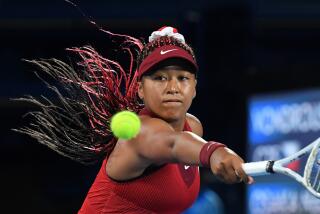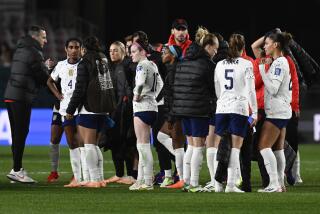Navratilova Takes Officials to Task
- Share via
NEW YORK — Martina Navratilova has been playing in Grand Slam tournaments since 1973, not counting the six-year absence when she went off to go skiing and play hockey. So when she uses the words best and worst, it holds a certain resonance.
“It’s the worst schedule that I’ve ever been a part of in any Grand Slam,” she said. “And you know what, if you ask the other players, they will tell you the same thing except they haven’t played as many Grand Slams as me.”
Navratilova was taking a break from her rigorous workout regimen in the fitness room off the locker room to talk to a couple of reporters Tuesday. She was, of course, talking about the rain-logged 2003 U.S. Open.
Her words, and those of others, contradicted the spin presented hours earlier by nervous Open officials. Although they were woefully short on specifics and contingency plans, they talked about the “tremendous” cooperation from the players.
Apparently, cooperation has been a one-way street in some situations.
Mary Pierce of France was asked if she was consulted about starting her match Monday at 11:10 p.m. EDT. She took the Grandstand Court in front of about 30 people.
“Were there that many?... I wasn’t asked when I wanted to play or not,” Pierce said.
Open officials were already jittery about the Andre Agassi situation and refused to say whether they would have done anything different even though Agassi already said they had apologized for the way the matter was handled when he could have finished his match against Yevgeny Kafelnikov on Saturday. It was held over to Sunday.
Navratilova was critical over the indecisiveness at the Open.
“The people who are making decisions aren’t allowed to make decisions,” she said. “The structure of who makes decisions needs to change....If you talk to the WTA people -- you can’t bad mouth anybody -- but their hands are tied. They [Open officials] have not been consulting players.
“When you know it’s raining at 11 a.m., you make choices. If it’s still raining at 2 p.m., we’ll let these matches go. If it’s still raining at 5 p.m., we’ll let these matches go. And this is going to be the revised order. Then they get to 5 p.m., they say, ‘Oh, OK.’ Everybody has been staying here longer than they should have. What they did to Kim Clijsters today was atrocious. She was supposed to be playing first on. She gets here at 9 a.m. and at 11 they tell her she’s not before 5 p.m.”
The hours passed and Clijsters, of Belgium, and her opponent, Amelie Mauresmo of France, went to the referee’s office to try to get a sense of what was going on late in the afternoon. Agassi, for his part, praised officials, saying he had full confidence in them.
Earlier, officials would not say whether they had a contingency plan about canceling certain events, and tournament referee Brian Earley made a mild faux pas when he addressed the issue.
“Remember, most of the senior events are only two sets and a tiebreak. Quite frankly, the doubles they play is not exactly taxing,” he said, as the room full of reporters laughed. “I’m sorry.... I promised you I wouldn’t put my foot in my mouth. I’ve already done it.”
Navratilova had the last word on television-driven decision-making at the Open.
“Of course, TV is important, yeah, it’s important to make money,” she said. “But you also have to run a good tournament. Those decisions are nearsighted, I think.”
More to Read
Go beyond the scoreboard
Get the latest on L.A.'s teams in the daily Sports Report newsletter.
You may occasionally receive promotional content from the Los Angeles Times.











